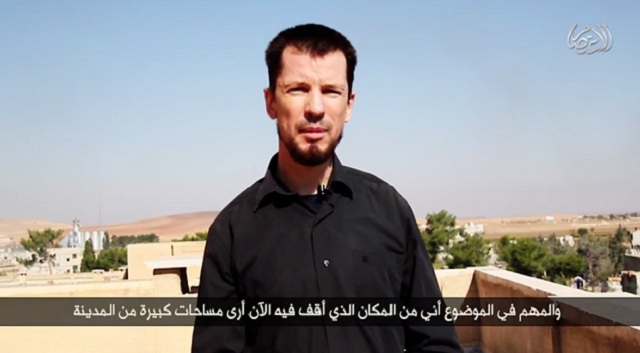Read the latest on this story:British hostage John Cantlie reappears in ISIS propaganda magazine

The regular release of ISIS propaganda magazine Dabiq this week came with one noticeable omission — a message from John Cantlie.
Cantlie, a British freelance photojournalist, is the last western hostage ISIS is known to be holding captive in Syria. In the year since the militant group began murdering captive British and American journalists and aid workers, Cantlie has been put forward as a sort of correspondent in ISIS’ propaganda targeting foreigners.
But in the issue of Dabiq that appeared online July 13, titled The Law of Allah or the Laws of Men there was no Western government-damning rant attributed to Cantlie.
READ MORE: ISIS, not Russia, is the conflict that keeps Canada’s new defence chief awake
As noted on Twitter by Rita Katz, the executive director of jihadist monitoring network SITE Intelligence Group, it’s the first time Cantlie was absent from the publication since he began appearing in its pages last October.
Others took note as well.
The above tweet from Charlie Winter, a senior researcher on jihadism at the U.K.-based Quilliam Foundation, makes an important point: there is no proof Cantlie wrote any of the essays published in Dabiq or the scripts he read off in a series of videos heralding the advances ISIS has made.

Get daily National news
READ MORE: ISIS captive John Cantlie in new video purportedly taken in Kobani
But his presence in ISIS propaganda campaign has served as sign of life for those who hold out hope for his safer return.
There has been concern about Cantlie’s fate in the past. In a February issue of Dabiq, Cantlie told his family to “let him go” and “get on with their lives.”
The message came months after his father, Paul Cantlie, issued a death-bed plea for his son’s release. The elder Cantlie died Oct. 21 from complications following pneumonia.
Cantlie was kidnapped in November 2012 along with American journalist James Foley — the first of the foreign hostages to be executed.
It wasn’t the first time Cantlie (or Foley, for that matter) had been taken hostage, but his 2012 capture lasted just one week. According to the New York Times, he was rescued by moderate Syrian opposition fighters.
Accounts from former ISIS hostages of other nationalities, whose releases came after hefty ransoms were paid, detailed how Cantlie, Foley and others were physically and psychologically tortured at the hands of ISIS.
With each murder that followed Foley’s beheading last August, the ISIS executioner known as “Jihadi John” warned another would follow if their governments didn’t meet demands of the disavowed al Qaeda offshoot.
READ MORE: ‘Jihadi John’ was born into ‘stateless’ family in poor corner of wealthy Kuwait
One by one, they were beheaded — American journalist Steven Sotloff, British aid workers David Cawthorne Haines and Alan Henning, American aid work Abdul-Rahman (Peter) Kassig, as well as Japanese captives Haruna Yukawa and Kenji Goto — until only Cantlie and Kayla Jean Mueller, an aid worker from Arizona, were left. Mueller was killed in February but in much different circumstances. ISIS claimed she died in a Jordanian airstrike. U.S. authorities refuted that, but the cause of her death has not been confirmed.
READ MORE: Amazon halts sale of ISIS propaganda magazine Dabiq
All of the kidnappings fuelled a debate about governments’ negotiating with terror groups, such as ISIS, for the release of hostages. Neither the U.S. nor the U.K. will pay ransoms for the release of their citizens, although President Barack Obama last month announced families of hostages would no longer have to fear prosecution for negotiating ransoms with their loved ones’ captors. But the government is committed to not paying ransoms itself.
The U.K. is not budging on its similar policy and Prime Minister David Cameron is one of the most hardheaded about paying ransoms to extremists. Along with the sale of stolen oil and antiquities, ISIS has earned millions of dollars off of ransoms — at least $20 million, according to an estimate in The Economist earlier this year.
Still, Cantlie’s supporters continue to call on the British government to broker his release.







Comments
Want to discuss? Please read our Commenting Policy first.